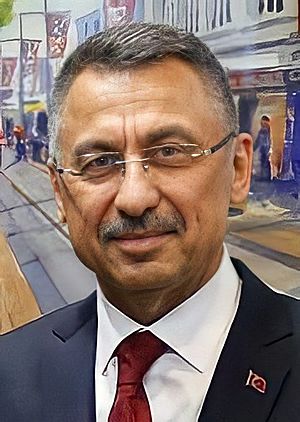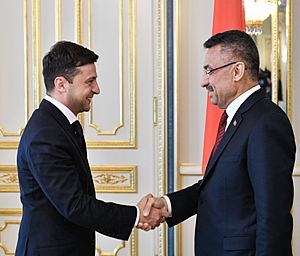Fuat Oktay facts for kids
Quick facts for kids
Fuat Oktay
|
|
|---|---|

Oktay in 2019
|
|
| 1st Vice President of Turkey | |
| In office 10 July 2018 – 4 June 2023 |
|
| President | Recep Tayyip Erdoğan |
| Succeeded by | Cevdet Yılmaz |
| Member of the Grand National Assembly | |
| Assumed office 2 June 2023 |
|
| Constituency | Ankara (III) (2023) |
| Undersecretary to the Prime Minister of Turkey | |
| In office 18 June 2016 – 9 July 2018 |
|
| Prime Minister | Binali Yıldırım |
| Preceded by | Kemal Madenoğlu |
| Succeeded by | Office abolished |
| Director of the Disaster and Emergency Management Presidency | |
| In office 2 January 2012 – 18 June 2016 |
|
| Prime Minister | Recep Tayyip Erdoğan Ahmet Davutoğlu Binali Yıldırım |
| Preceded by | İbrahim Ejder Kaya (acting) |
| Succeeded by | Mehmet Halis Bilden |
| Personal details | |
| Born | 21 January 1964 Çekerek, Yozgat, Turkey |
| Political party | Justice and Development Party |
| Children | 3 |
| Alma mater | Çukurova University Wayne State University |
Fuat Oktay, born on January 21, 1964, is a Turkish politician and public servant. He made history as the first Vice President of Turkey. He held this important role from 2018 to 2023. Before that, he worked as an undersecretary for the Prime Minister of Turkey.
Contents
Early Life and Education
School Days and University
Fuat Oktay was born in a town called Çekerek in Yozgat, Turkey. He went to Çukurova University to study management. After finishing his studies in 1985, he started working at the university. He was a research assistant there.
In 1990, he traveled to the United States. He earned a master's degree from Wayne State University in Detroit. He studied business and manufacturing engineering. He also earned a doctorate in industrial engineering. While in the U.S., he focused on car engineering and communication.
Working as a Consultant
During a tough economic time in Turkey in 2001, Oktay helped manage the crisis. He also led the Management Department at Beykent University. He was also the deputy dean there. Besides his university work, Oktay advised many businesses. He worked for both government-owned and private companies. He held roles like general manager and vice president.
Work in Private Companies
From 2008 to 2012, Oktay worked at Turkish Airlines. He was a deputy general manager. He helped with planning, business growth, and technology. He also worked on sales and marketing. He was involved in many projects to improve Turkish Airlines. He also served on boards for business councils. These councils helped connect Turkish businesses with those in England, Germany, and Spain.
Oktay also served on the executive board of Turkish Aerospace Industries (TAI). He was also on the board of Turkish Technic. He was also the vice president of Türk Telekom.
Public Service Roles
Between 2012 and 2016, Oktay led the Disaster and Emergency Management Presidency (AFAD). This agency helps people during disasters. During his time, he made agreements with other countries. These agreements helped Turkey manage risks and crises better.
Helping the Prime Minister
In 2016, Binali Yıldırım became the Prime Minister of Turkey. Fuat Oktay was chosen to be his undersecretary. This meant he worked closely with the Prime Minister. He was known for making government offices more modern. He brought in new digital tools and technology.
Oktay played a key role during the 2016 Turkish coup d'état attempt. This was a difficult time for Turkey. He also helped coordinate different government groups. This was during military operations like Operation Euphrates Shield.
Becoming Vice President

In 2017, Turkey held a special vote called a constitutional referendum. Voters approved changes to the country's government system. The old system had a prime minister. The new system created an "executive presidency." This meant the President of Turkey would be both the head of state and the head of government. The role of prime minister was removed. The new system also created the job of Vice President of Turkey. The president would choose the vice president.
How the Vice President Role Started
In 2018, Turkey held general elections. People voted for a new president and members of parliament. Recep Tayyip Erdoğan won the presidency. He became the first president under the new system. Many people thought he would choose a vice president who was good at managing things. They also thought he might choose only one vice president.
On July 9, 2018, Fuat Oktay was announced as Turkey's first Vice President. He officially started his job the next day.
Becoming a Member of Parliament
In March 2023, President Erdoğan announced that Fuat Oktay would run for parliament. Oktay was elected as a member of parliament in the elections held in May 2023. He represents Ankara III.
See also
 In Spanish: Fuat Oktay para niños
In Spanish: Fuat Oktay para niños

